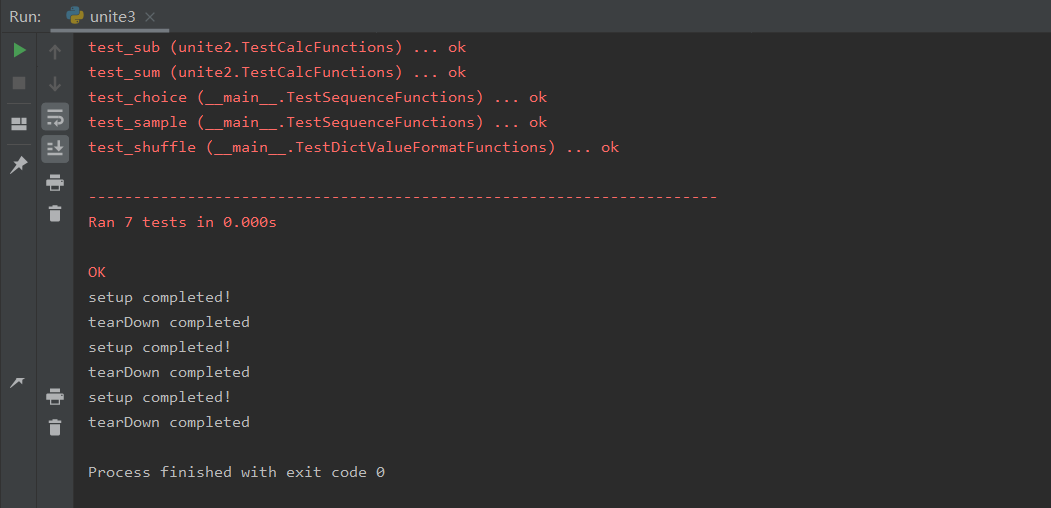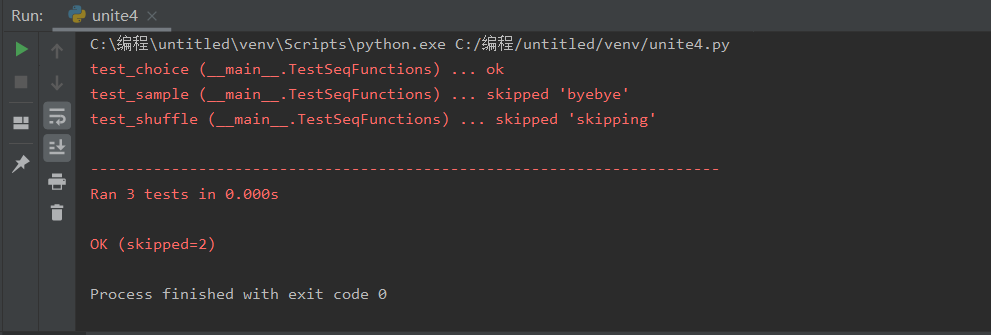183
社区成员
 发帖
发帖 与我相关
与我相关 我的任务
我的任务 分享
分享| The Link Your Class | https://bbs.csdn.net/forums/MUEE308FZ?category=0 |
|---|---|
|
The Link of Requirement of This Assignment | https://bbs.csdn.net/topics/603793939 |
| The Aim of This Assignment | Software Testing-Junit Test |
| MUID&FZUID | 19105738 & 831901221 |
Learn related knowledge about Junit Test for Java and Unittest for python. You can finish the following assignment or test Your Project.
1.
import unittest, random
# Unit Test Class
class MyTest(unittest.TestCase):
# assertEqual()
def test_assertEqual(self):
# test if a+b equals sum or not
try:
a, b = 1, 2
sum = 3
self.assertEqual(a + b, sum, 'assert failed!,%s + %s != %s' % (a, b, sum))
except AssertionError as e:
print(e)
# assertNotEqual()
def test_assertNotEqual(self):
# fix missing three lines of codes below ‘try’, test if b-a equals res or not
try:
a, b = 1, 2
res = 0
self.assertNotEqual(b - a, res, 'assert failed!,%s + %s != %s' % (a, b, res))
except AssertionError as e:
print(e)
# assertTrue()
def test_assertTrue(self):
try:
self.assertTrue(1 == 1, "False expression")
except AssertionError as e:
print(e)
# assertFalse()
def test_assertFalse(self):
# fix missing codes below ‘try’, only a line of codes needed
try:
self.assertFalse(1 != 1, "False expression")
except AssertionError as e:
print(e)
# assertIs()
def test_assertIs(self):
# test a and b are totally same
try:
a = 12
b = a
self.assertIs(a, b, "%s and %s are not same" % (a, b))
except AssertionError as e:
print(e)
# assertIsInstance()
def test_assertIsInstance(self):
# fix missing codes below ‘y=object’ to test type(x) != y, only a line of codes needed
try:
x = MyClass
y = object
self.assertIsNot(x, y, "%s and %s are not same" % (x, y))
except AssertionError as e:
print(e)
if __name__ == '__main__':
# run unittest
unittest.main()

2.
# TestCalc.py
import unittest
import random
from Calc import Calc
class TestCalcFunctions(unittest.TestCase):
def setUp(self):
self.c = Calc()
print("setup completed!")
def test_sum(self):
self.assertTrue(self.c.add(1, 2, 3, 4) == 10)
def test_sub(self):
# fix a line of codes to test c.sub(self, a, *b) method
self.assertTrue(self.c.sub(10, 1, 2, 3, 4) == 0)
def test_mul(self):
# fix a line of codes to test c.mul(self, *b) method
self.assertTrue(self.c.mul(1, 2, 3, 4) == 24)
def test_div(self):
# fix a line of codes to test c.div(self, a, *b) method
self.assertTrue(self.c.div(10, 2, 5) == 1)
def tearDown(self):
print("test completed!")
def tearDown(self):
print("tearDown completed")
if __name__ == '__main__':
unittest.main()

3.
# unittest_suite.py
import random
import unittest
from unite2 import TestCalcFunctions
class TestSequenceFunctions(unittest.TestCase):
def setUp(self):
self.seq = list(range(10))
def tearDown(self):
pass
def test_choice(self):
# chose an element from seq randomly
element = random.choice(self.seq)
# check element is truly in the sequence
self.assertTrue(element in self.seq)
def test_sample(self):
# if codes raise exception
with self.assertRaises(ValueError):
random.sample(self.seq, 20)
for element in random.sample(self.seq, 5):
self.assertTrue(element in self.seq)
class TestDictValueFormatFunctions(unittest.TestCase):
def setUp(self):
self.seq = list(range(10))
def tearDown(self):
pass
def test_shuffle(self):
# shuffle sequence
random.shuffle(self.seq)
self.seq.sort()
self.assertEqual(self.seq, list(range(10)))
# check TypeError exception
self.assertRaises(TypeError, random.shuffle, (1, 2, 3))
if __name__ == '__main__':
# get all test methods start with ‘test’ and return a suite
suite1 = unittest.TestLoader().loadTestsFromTestCase(TestSequenceFunctions)
# please fix another two suite, suite2 of TestCalcFunctions and suite3 of TestDictValueFormatFunctions
suite2 = unittest.TestLoader().loadTestsFromTestCase(TestCalcFunctions)
suite3 = unittest.TestLoader().loadTestsFromTestCase(TestDictValueFormatFunctions)
# put more test class into suite
# you can change suites’ order, like [suite1, suite2, suite3]
suite = unittest.TestSuite([suite2, suite1, suite3])
# set verbosity = 2 you could get more detailed information
unittest.TextTestRunner(verbosity=2).run(suite)

4.
# encoding=utf-8
import random, sys, unittest
import platform
class TestSeqFunctions(unittest.TestCase):
a = 1
def setUp(self):
self.seq = list(range(20))
@unittest.skip("skipping") # skip this method anyway
def test_shuffle(self):
random.shuffle(self.seq)
self.seq.sort()
self.assertEqual(self.seq, list(range(20)))
self.assertRaises(TypeError, random.shuffle, (1, 2, 3))
# add a line of annotation thatskip this method if a>5
@unittest.skipIf(a>5,"don't run")
def test_choice(self):
element = random.choice(self.seq)
self.assertTrue(element in self.seq)
# add a line of annotation that skip if not in linux platform
@unittest.skipIf(platform.system().lower != 'linux',"byebye")
def test_sample(self):
with self.assertRaises(ValueError):
random.sample(self.seq, 20)
for element in random.sample(self.seq, 5):
self.assertTrue(element in self.seq)
if __name__ == "__main__":
# unittest.main()
suite = unittest.TestLoader().loadTestsFromTestCase(TestSeqFunctions)
suite = unittest.TestSuite(suite)
unittest.TextTestRunner(verbosity=2).run(suite)

5.
# encoding=utf-8
import unittest
from Calc import Calc
class MyTest(unittest.TestCase):
@classmethod
def setUpClass(self):
print("init Calc before unittest")
self.c = Calc()
def test_1add(self):
print("run add()")
self.assertEqual(self.c.add(1, 2, 12), 15, 'test add fail')
def test_2sub(self):
print("run sub()")
self.assertEqual(self.c.sub(2, 1, 3), -2, 'test sub fail')
def test_3mul(self):
print("run mul()")
self.assertEqual(self.c.mul(2, 3, 5), 30, 'test mul fail')
def test_4div(self):
print("run div()")
self.assertEqual(self.c.div(8, 2, 4), 1, 'test div fail')
if __name__ == '__main__':
unittest.main()
